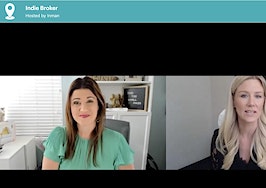If you’d like to catch a video replay of this Connect Now session, and access the other 25+ hours of video content from Connect Now, tickets are still available. Click here to access.
Over the course of Broker Connect on Wednesday at Inman Connect Now, panel speakers discussed what actions brokers should take in upcoming months to move forward in the wake of the COVID-19 pandemic and national upheaval.
“As brokers today, you guys are in a very unique place,” panel moderator Brian Copeland, founder/owner of Doorbell Real Estate, said.
Brokers have an opportunity now to evaluate their company culture and how a brokerage’s physical space and technological offerings can impact that culture.
Brokerage culture
Copeland noted that brokers can spend up to four times as much money on an unhappy agent, which is why it’s important to regularly evaluate your team members and how well they fit into the group.
“The key to a great company is great people” panel moderator Tiffany Curry, broker/owner of Tiffany Curry & Co., Realtors at Berkshire Hathaway HomeServices said, reflecting on an agent that she used to have on her team who ended up not being the right fit.
“It wasn’t us as a brokerage, it was them as a person,” Curry said.

Tiffany Curry, Sarah Layson and Scott Curcio at Broker Connect
Later on in Broker Connect, Sarah Layson, team leader/owner of Layson Group at Keller Williams Realty, noted that she’s regularly touching base with agents, especially now, to see how they’re doing amidst the crisis and making sure that they’re still a good fit.
“A culture of caring and a culture of empathy is more important now than ever,” Layson said.
“Just keep[ing] in mind that we are all human beings and in order for us to grow, it’s so important to reach out to everyone right now, and do[ing] what I call ‘I care’ calls,” Layson added. “I do think it’s our duty to help those around us and I do think you can pair them up with a different office if they’re not a fit for your team.”
How the office will change
Panelists in the “What Do I Do With My Office Space” discussion talked about how offices may change in the future post-COVID-19, and how that might impact company culture.
Although Christina Pappas, vice president of Keyes Realty in Miami, said she thought mergers and expansions would continue in the near future, she thought offices would become smaller and more intimate.
“I think it needs to get a lot smaller, but feel like a Starbucks,” Pappas said, meaning that agents would go into the office to get business and deals done, but also use it as a place to congregate.
“Encouraging that togetherness is important, and also making sure you have that camaraderie,” Pappas said.
Geoff Lewis, president of JPAR, noted that his current offices, which are fairly minimal with only keypad access and no receptionist, would probably be on top of office trends moving forward, and that agents would continue to want to have a place to meet in-person.
“I think we’re finding that working totally virtual is socially isolating,” Lewis said.
“In light of current events … the office space has been a place for me to interact with people of different genders, race, backgrounds, sexual orientations … and I think that’s really important right now,” he added.
Lewis also noted that JPAR recently formed a new group called “Repaid” (Real Estate Professionals Against Discrimination), an organization that will meet once a week in JPAR offices to discuss discrimination issues in the profession. Their office will also be open up to community groups to reserve as well to discuss similar issues.
Given heated discussions that have surfaced recently both in regards to political differences in how to respond to the COVID-19 pandemic as well as responding to recent protests against racial discrimination throughout the country, the panel also addressed how they handle monitoring agents’ social media posts.
Pappas noted that her brokerage actually has technology that monitors all of the firm’s social media so that they can swiftly address inappropriate posts when needed.
When an agent in Lewis’ brokerage recently posted something inappropriate on social media and he was notified, he said management immediately handed the agent his license back.
“We just have no tolerance for that,” Lewis said.
The future for buyers

Tiffany Curry, Keith Robinson and Kenny Truong at Broker Connect
Keith Robinson, chief strategy officer at NextHome, and Kenny Truong, sales team leader at eXp Realty, said that buyer demand is still very palpable, despite the disruption of the pandemic.
“Buyers’ desire for a home outpaced their fear of COVID,” Robinson said. “The life factors that propel people into buying and selling are still there for folks.”
Robinson also noted that while some forecasts have pointed toward a movement out of cities toward more rural areas, he thinks that many people will still want to live in cities.
“All of the reasons that people flocked [to cities] are still there,” Robinson said. “I don’t think we’re going to see this mass exodus from these world-class cities.”
“Buyers are still very, very active,” Truong said. “Just this week alone, there was a house in Hayward that had 31 offers.”
Tech value for brokers

Brian Copeland, Kyle Killebrew and Candy Miles Crocker at Broker Connect
During a poll that Copeland issued to attendees of Broker Connect’s “Profit in Focus: Lowering Your Costs, Saving Your Bottom Line” panel, 47 percent of respondents said that only about half of their agents are using the brokerage’s technology suite to its full potential.
Candy Miles Crocker, associate broker at Long and Foster Real Estate, and Kyle Killebrew, broker/partner of Killebrew Real Estate at The Real Estate Group, stressed the importance of evaluating what services your brokerage is currently paying for and whether or not they’re worth the cost.
“If you’re not using the system, why are you paying for it?” Copeland emphasized.
Crocker said having a good CRM was essential for her to keep her business running efficiently.
“It’s just too difficult if you don’t have a good CRM to keep in touch with the people you need to keep in touch with,” she said.
Killebrew said that his lead management and transaction management systems through BoomTown were most important for his team.
“We just couldn’t function without those two systems,” Killebrew said.
Crocker, Killebrew, Copeland and Curry all agreed that if there’s value to a particular service brokers and agents alike are happy to pay for it.
“I think that people are always going to be willing to pay for a service — period,” Killebrew said.
If you’d like to catch a video replay of this Connect Now session, and access the other 25+ hours of video content from Connect Now, tickets are still available. Click here to access.









